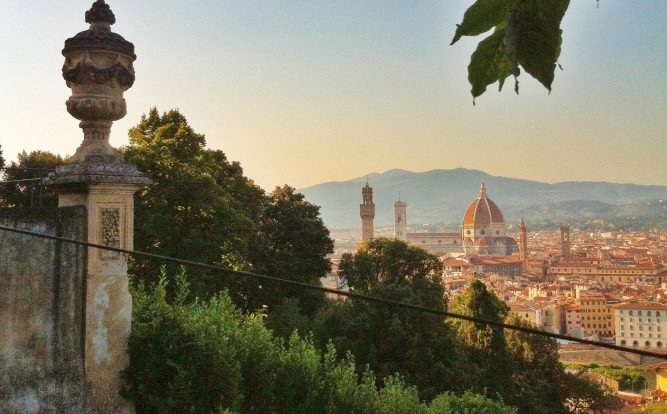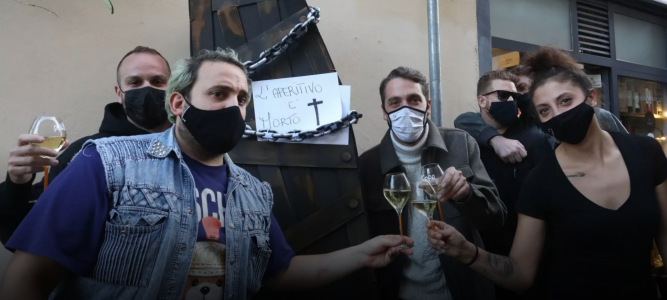A Month of Social Lockdown for Italy

As COVID cases are ticking upward around Europe, Italy remains vigilant while incorporating new restrictions almost daily. The latest national decree (DCPM) issued on October 25, 2020 will last for nearly a month — until November 24 — in an effort to contain the spread. It was issued not a day too soon: on October 26, 2,171 new Coronavirus patients with an average age of 43 were reported in Tuscany out of a population of 3.7 million, and 13 deaths (average age: 83) were reported.
Restaurants, cafés, bars, gelato and pastry shops, which can open as early as 5 am, take a severe hit, now being required to close every night by 6 pm. Though, while dinner out is no longer an option, Sunday lunch has been saved, and restaurants can offer take out and delivery until midnight. But it is now prohibited to eat food or drink in public places, and dining in restaurants is limited to four people at a table and not more unless they all live together.
With the new limitations, restaurant owners in Florence have decided to walk to Rome starting from Ponte Vecchio with a departure date of November 4 (the anniversary of the 1966 flood) to try to convince the Prime Minister to modify the new closing hours which are causing serious economic hardship.
In Florence’s central Piazza Ottaviani (near piazza Santa Maria Novella) a group of friends staged a mock funeral with signs reading “L’Aperitivo (Happy Hour) is Dead” and “The Funeral of the Spritz” holding Aperol Spritzes in their hands (see photo gallery on the Florence’s La Repubblica news site).

Discos remain closed, and cinemas and theatres, as well as pools, gyms, dance studios and centers, spas, hot spring (except those hosting a medical facility offering rehabilitation) and ski resorts have shut down thanks to the latest decree. Museums however are still able to operate and host exhibitions with proper attention to crowd size and maintenance of social distancing between visitors.
Masks must be worn at all times, even indoors if there are guests from outside of the household, which is strongly advised against.
Guests cannot enter nursing homes or assisted living facilities in the near future. In Tuscany, governor Eugenio Giani has prohibited visits to patients in regional hospitals by family or friends for the time being.
It is also highly recommended that private and public transportation be avoided, apart from commuting to work, school, hospitals and care centers, and for other urgent needs. For now, it is still possible to travel between regions within Italy, towns and cities.
High schools are adopting a 3:1 ratio of in person to online courses and introducing shifts so students enter and leave school at different times.
Before, sports were able to continue with no more than 1,000 spectators outdoors and 200 indoors. Now, all sporting events and competitions, public and private, are suspended unless for a professional athlete or team recognized by national sports federations or international sports organizations.
Other activities that must stop for the month include parties and receptions, especially those usually held after religious and civil ceremonies. Protests are outlawed because of lack of social distancing but situations like sit-ins where there is no movement and social distancing can be enforced are OK. Amusement parks, betting halls, and casinos have also been closed, but young children and teenagers may still go to playgrounds and other outdoor spaces for recreational and educational purposes with appropriate supervision and safety protocols.
Local, national and international fairs and festivals have also been cancelled; there is however, the option to hold events behind closed doors in live streaming.
Mayors also have the possibility to decide whether certain piazzas and streets where people typically congregate should close after 9 pm, where in Florence mayor Dario Nardella has already taken action. Piazzas Strozzi, della Repubblica, and dei Ciompi, and via Sassetti, Strozzi, Pellicceria, and Pietrapiana, in addition to Sant’Ambrogio and Borgo La Croce can only be accessed if returning home. (cathy doherty)
To read the full decree in Italian, visit La Repubblica news site.
